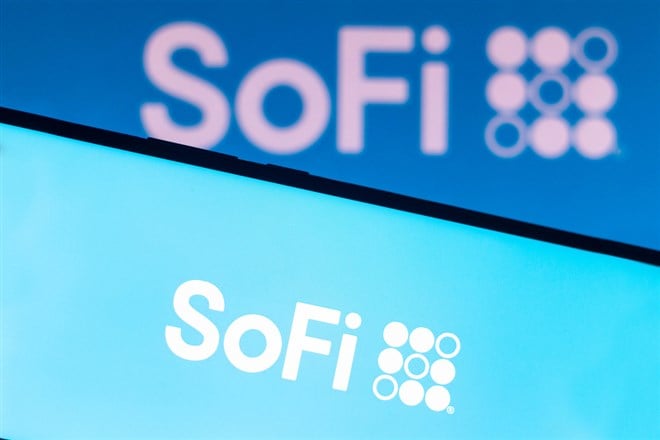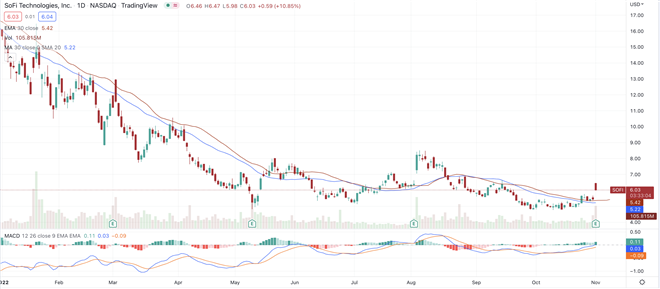 Shares of online lender SoFi Technologies (NASDAQ: SOFI) were up more than 14% Tuesday following a better-than-expected third-quarter report.
Shares of online lender SoFi Technologies (NASDAQ: SOFI) were up more than 14% Tuesday following a better-than-expected third-quarter report. The company lost $0.09 per share on revenue of $424 million.
Those results marked year-over-year increases on both the top and bottom lines. Revenue has grown at mid-to-high double-digit rates in each of the past six quarters. The company, which went public in December 2020, has not yet posted a profit, but yearly losses have been narrowing. Analysts expect SoFi to report a loss of $0.45 per share this year, with a smaller loss of $0.26 per share in 2023.
Boosting the share price Tuesday was the company’s increased outlook for the full year. It now expects 2022 adjusted net revenue in a range of $1.517 billion to $1.522 billion, up from $1.508 billion to $1.513 billion previously. It expects full-year adjusted EBITDA of $115 million to $120 million, up from $104 million to $109 million previously.
In the earnings release, CEO Anthony Noto said strength across all three of SoFi’s business segments - lending, technology platform, and financial services - drove record third-quarter adjusted net revenue.
He added that the company added nearly 424,000 new members in the quarter, for a total of 4.7 million members. That’s a 61% year-over-year increase.
Noto specifically referred to SoFi’s bank charter as a driver of revenue.
This year, SoFi received its national banking charter as a result of its acquisition of Golden Pacific Bancorp. That deal was completed in early February. SoFi had been attempting to get a banking charter for years before the Golden Pacific Bancorp transaction finally allowed that.
Total Deposits Growing
In the earnings statement, Noto said, “Our bank charter is enabling new flexibility that has proven even more valuable in light of the current macro environment, and the economic benefits are already starting to materialize and positively impact our operating and financial results. Total deposits grew 86% during the quarter to $5.0 billion at quarter-end, and 85% of SoFi Money deposits (inclusive of Checking and Savings and SoFi Money cash management accounts) are from direct deposit members.”
He specifically pointed out that for new direct deposit accounts opened in the third quarter, the median FICO score was 750. While in theory, a bank depositor’s credit score doesn’t really matter, it’s important to SoFi because a higher credit score means the company can also market loans, such as mortgages, to banking customers.
Noto addressed that directly, saying, “As a result of this growth in high-quality deposits, we have benefited from a lower cost of funding for our loans.”
Typical banking revenue streams also played a role in the strong quarter. Because of increased deposit funding, SoFi was a ble to capture additional net interest margin and optimize returns, what the company termed “a critical advantage in light of notable macro uncertainty.”
MarketBeat analyst data for SoFi show a “moderate buy” rating on the stock, with a price target of $13.36, a potential upside of 116.13%.
Following Tech Sector Trajectory
SoFi’s chart tells a story of pandemic-era tech optimism gone bust. After going public, the stock’s price more than doubled in the next two months. Techs in general, including other fintech firms, such as DLocal (NASDAQ: DLO) and Upstart (NASDAQ: UPST), followed a similar trajectory of rallying into early 2021, then correcting, before attempting fresh rallies in early April of last year.
Starting in mid-June, SoFi began etching a cup-with-handle pattern with a 46% correction. The stock broke out of that base exactly a year ago, on November 1, 2021. From there, it rolled over fairly quickly as the broader market weakened going into the end of the year. SoFi has tracked the wider tech sector, with a consistent downtrend this year, broken up by a failed rally attempt in August.
So what does that mean for the moment? SoFi fell to a new low of $4.77 on October 11. Shares were trading around $6.05 midway through Tuesday’s session.













